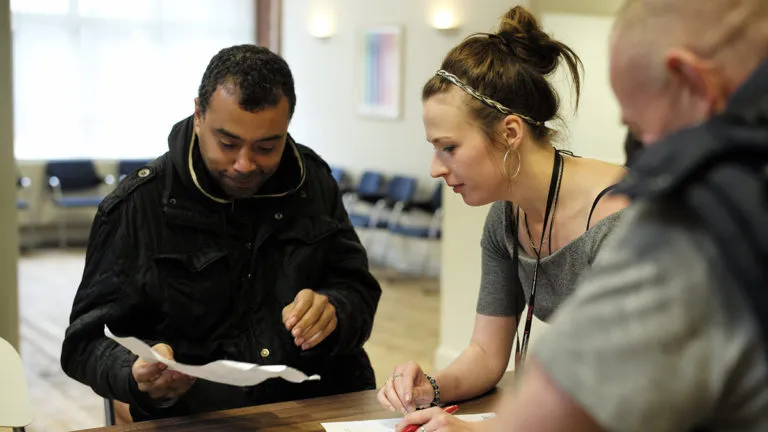Former rough sleepers being hit by maximum universal credit deductions
Published: by Sophie Earnshaw

In the last few months, universal credit has been failing some of its most vulnerable claimants. People who have recently moved into settled accommodation after years of living on the streets are struggling to pay for heating and food – all due to huge deductions being taken from their universal credit payments to repay court fines.
What’s happening
The issue of these large deductions was picked up on by our case workers on the Greater Manchester Homes Partnership, an entrenched rough sleepers’ service in Manchester. The city has one of the highest rates of rough sleeping in the country and in 2018, it was recorded that Manchester also had the third highest number of deaths of rough sleepers in the country.
In Manchester, we work with long-term rough sleepers who have been on the streets for at least two years. Many of the people we help have been sleeping rough for most of their adult lives. The aim of the service is to support rough sleepers into safe and secure homes while working in partnership with social housing providers. In addition to helping people off the streets, the team assists with welfare benefits and supporting people to manage their tenancies and keep their homes. The project, set up in January 2018, has been a fantastic success and has already helped 200 people to find and maintain settled accommodation, often after years of being failed by other services and the housing market.
But the Department for Work and Pensions (DWP) has been deducting the maximum amount from universal credit for repayment of historic court fines. This issue affects anyone who has a court fine – however, those with experience of rough sleeping are more likely to be affected due to the criminalisation of rough sleeping activity such as begging or travelling on public transport without a ticket.
For court fine repayments, the DWP has discretion to take a minimum amount of 5% of Universal Credit, particularly in cases of financial hardship. So, £2.91 per week for people under 25 years old and £3.67 per week for those over 25[1]. However, the DWP is refusing to exercise its discretion and is instead applying the maximum 30% rate for repayments, which is leaving people struggling to survive. After the deductions are taken, people are left with as little as £41 per week, which is often nowhere near enough to cover even essential living costs.
The knock-on effect of these deductions is huge
In these cases where clients have existing court fines to repay, we’re seeing that the highest rate deductions are being taken from benefits meant for living expenses including food, heating, and clothes. The people we work with have been supported in making the pivotal step of moving off the street and into a secure home. Having a roof over your head is so important, but you also need to be able to cover household expenses and have enough to eat. The insufficient amounts people are being left with leads to spiralling debt and worsening mental and physical health.
Tom Fisher, Shelter team leader for the Greater Manchester Homes project, reports that this issue has meant people are having to constantly rely on local food banks. Our service has also been topping up electricity and gas for people just so that they can stay warm and cook food. Those affected need this additional support now more than ever, both with the cold winter months and by virtue of being at a critical stage of moving off the streets, managing a tenancy, and household bills.
‘The impact of these high rate deductions on the people we help, is extremely damaging,’ Tom explains. ‘We have been working hard to support rough sleepers off the streets and into a secure home. That they are now struggling to pay the bills and food, is unjust and frustrating. They are being forced to choose between eating or staying warm, even in their own homes.
‘The people we work with already suffer from significant mental health issues and this additional pressure is contributing to their anxiety. There is a real risk they might start to lose hope and give up, hindering the massive progress they’ve made.’
If you or someone you know is struggling with maximum deductions for fine repayments, you can request the amount is lowered on the Universal Credit Journal and seek advice from an organisation that can help write a letter to the DWP challenging the deductions.
Shelter would like to hear from advice agencies supporting people in similar circumstances who are being affected by these maximum deductions for court fines. Please contact sophie_earnshaw@shelter.org.uk.
The Greater Manchester Homes Partnership is a collaboration between a group of organisations with a common goal: to prevent and relieve homelessness in Greater Manchester. The initiative has been launched and funded by One Manchester and Trafford Housing Trust, two of Greater Manchester’s largest housing providers, in conjunction with Bridges Fund Management, a specialist impact investor. The programme is being delivered by Shelter, Great Places and The Brick.
We support homeless people all year round, but we especially need your help in these cold winter months. Please donate towards the work we do helping rough sleepers in Manchester.
[1] The Regulations provide that a minimum of 5% of the standard allowance for Universal Credit can be deducted for court fines. Reg 4 of The Fines (Deductions from Income Support) Regulations 1992